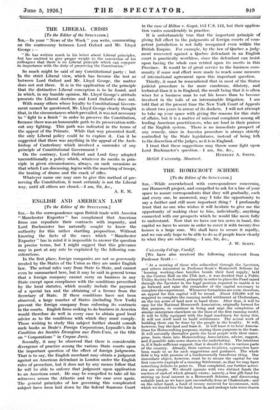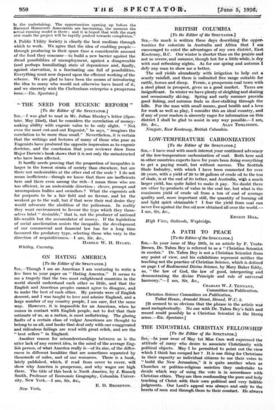THE HOMECROFT SCHEME
[To the Editor of the SPECTATOR.] SIR,--While overwhelmed with correspondence concerning, our Homecroft project, and compelled to ask for a line of your space to assure correspondents that they will gradually, each and every one, be answered, may I take the opportunity to say a further and still more important thing ? I profoundly trust that no one who wishes it will hesitate to give me the opportunity of making clear to him, individually, anything connected with our prospects which he would like more fully .to understand. Now that we have our ten acres in hand, the capital we have to secure in order to cover it with twenty-five houses is, a large sum. We shall have to secure it rapidly, and we can only hope to be able to do so if people know clearly to what they are subscribing.—I am, Sir, &c., I.Tniversity CoVege, Cardiff. J. W. Scorr.
[We have also received the following statement from Professor Scott :— " At a meeting of those who subscribed through the Spectator, and others interested in Professor Scott's Homecroft Scheme for ' housing working-class families beside their food supply,' held in the Caxton Hall on the 27th inst., it was decided that a Public Utility Society be formed, primarily in order to place the Fund raised through the Spectator in the legal position required to enable it to go forward and raise the remainder of the capital necessary to complete the experiment. Whenever formalities are over, therefore, an appeal for this capital will be issued. About £10,000 will be required to complete the running model settlement at Cheltenham, on the ten acres of land now in hand there. After that, it will be easy for the National Homecroft Association, originally formed for this purpose, to continue in being and urge the completion of similar enterprises elsewhere on the lines of the first running model. It will be fully equipped with the legal machinery for doing this. It will not itself need to build settlements. The actual work of building them can be done by the people in the locality. It will, however, buy the land and lease it. It will lease it to local Associa- tions for Homecrofting purposes, stating these purposes in the lease. It will naturally thereafter guide the local people with their enter- prise, form them into Homecrofting Associations, advise, suggest, and if possible take some shares in the undertaking. The intention is, if it finds sufficient support, that it should do this in various parts of the country. Already, from various localities, approaches have been made to us for such suggestions and guidance. The whole field is big with promise of a fundamentally beneficent thing. Our immediate object, however, must be to secure the capital for our first concrete example of a running Settlement, so that we may have something definite to point to. That completed, our further activi- ties are simple. We should operate with two diiitinct funds the nucleus of each of which already exists; namely, a free gift fund for stirring up local interest in a Homecroft Scheme, and discovering suitable land, as we have just successfully done at Cheltenham ; and on the other hand, a fund of money received for investment, with which we should buy the land, lease it. and perhaps take some shares in the undertaking. The opportunities opening up before the National Homecroft Association are fascinating, the moment the actual running model is there ; and it is hoped that with the start now made the project will be rapidly pushed towards completion."
A Public Utility Society is clearly the best medium through which to work. We agree that the idea of enabling people— through producing in their spare time a considerable amount of the food they consume—to build a new barrier against the dread possibilities of unemployment, against a disagreeable (and perhaps humiliating) state of dependence and, _filially, against starvation, is a fascinating one full of possibilities. Everything must now depend upon the efficient working of the scheme. We are glad to have been the means of introducing the idea to many who would not otherwise have heard of it, and we sincerely wish the Cheltenham enterprise a prosperous issue.—En. Spectator.]











































 Previous page
Previous page